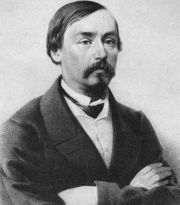

This 1857 poem by Nikolay Nekrasov illustrates how Russia since Peter the Great has always taken a close interest in European affairs--or to put it another way, how Russia became part of Europe through Peter the Great widespread reforms.
With this translation, I have tried to keep as close as possible to Nekrasov’s Russian and to his lineation. I have not attempted to replicate his rhyme scheme (ababcdccd) or his tetrameters. Nor have I followed the original punctuation.
As is often the custom in Russian poetry, Nekrasov offers no title. I have chosen “In the Capitals.” Another common aspect of Russian poetry is the ellipsis; I have kept it here.
Clamour in the capitals; orators are thundering.
A war of words is raging.
But in the depths of Russia
There’s an age-old silence.
Only the wind isn’t bringing peace
To the tops of the roadside willows.
And bowing in an arc,
Kissing mother earth,
Ears in endless cornfields…
Nikolay Nekrasov 1858
This subtle poem expresses through its images that although it is remote from Europe, Russia is disturbed by political furore in Europe and is paying attention to it.
Unfortunately the standard English translation on the Internet (ruverses.com, for example), by Babette Deutsch and Avrahm Yarmolinsky, does not capture this message. Instead the poem becomes a basic comparison between a turbulent Europe and a peaceful Russia. The essence of the poem is missed.
I would like to continue with a critique of the Deutsch-Yarmolinsky translation and suggest why they missed the point of Nekrasov’s poem in their translation..
First, here is the Deutsch-Yarmolinsky translation (ruverses.com):
The capitals are rocked with thunder
Of orators in wordy feuds.
But in the depths of Russia, yonder,
An age-old awful silence broods.
Only the wind in wayside willows,
Coming and going, does not cease;
And corn-stalks touch in curving billows
The earth that cherishes and pillows,
Through endless fields of changeless peace.
This reads well as a poem and also replicates Nekrasov’s rhymes and tetramers. But all this comes with a cost.
First of all, Deutsch and Yarmolinsky have added a lot of new words and phrases that are not in Nekrasov’s poem: awful, brood, coming and going, cease, corn stalks, billows, cherishes, pillows, through, changeless peace. I don’t think it’s right for a translator of poetry to add words and phrases, even if they fit well with the poem’s meaning. Of the ten additions, I can’t justify any. And “awful” is especially wrong: the silence in Russia is not “awful” in Nekrasov’s poem, and it certainly doesn’t “brood.”
Some of the additions are used by Deutsch and Yarmolinsky to achieve the rhymes. Thus “pillows” and “billows” are added to rhyme with “willows.” Neither “billows” (that has a marine connotation) nor “pillows” (that suggest comforting) is correct. As well, “cease” is added to rhyme a line with “peace,” as is “broods” for “feuds.”
Other additions are used to maintain the tetrameters: “coming and going,” “changeless peace” and “that cherishes.” None of these is in the original poem. None of them adds anything. In short they are padding.
I have a few other issues with this translation—like the omission of “mother nature” and kissing”-- but I will make do with my main point on translating poetry: Replicating rhyme and meter, with most languages, all too often leads to a betrayal of the original.
I grant that on the face of it, Deutsch and Yarmolinsky translation is better poem—for its rhyme and its meter—but it is not close to a faithful translation of Nekrasov’s poem. Fidelity should be the priority. Fidelity is what I expect in a translation—unless it is labeled differently, as Robert Lowell did with his “Imitations.”
*
Nikolay Nekrasov’s poem:
В столицах шум, гремят витии,
Кипит словесная война,
А там, во глубине России, –
Там вековая тишина.
Лишь ветер не дает покою
Вершинам придорожных ив,
И выгибаются дугою,
Целуясь с матерью землею,
Колосья бесконечных нив...
Leave a Comment